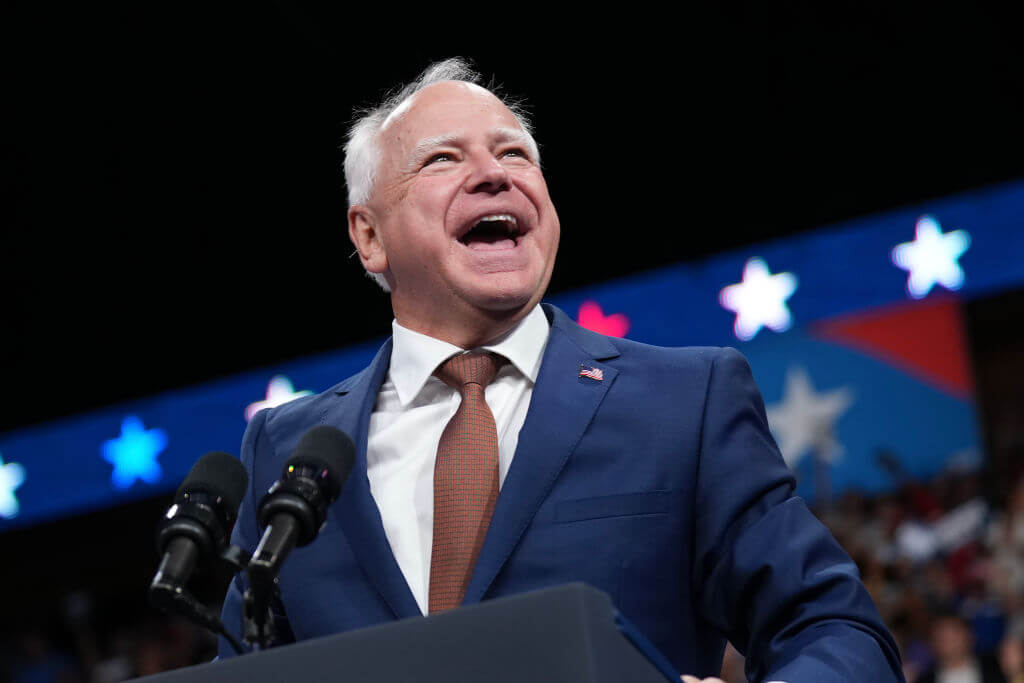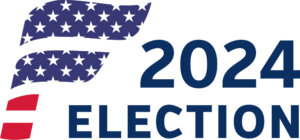Is Tim Walz Jewish? No, but his Lutheran values are
In his home state, Jews call him the “Minnesota Mensch”

Minnesota Gov. Tim Walz speaks at a campaign rally on August 9 in Glendale, Arizona. Photo by Andrew Harnik/Getty Images
Gov. Tim Walz, who is Lutheran, doesn’t officially have a rabbi. But if he did, it would be Rabbi Marcia Zimmerman of Temple Israel, a Reform synagogue in Minneapolis. (Zimmerman was actually Vice President Walter Mondale’s rabbi, but that’s a story for another time.)
 “I am shepping a lot of nachas,” she said of Walz’s vice presidential nomination, using a Yiddish phrase for having warm feelings of pride. “He’s really remarkable.”
“I am shepping a lot of nachas,” she said of Walz’s vice presidential nomination, using a Yiddish phrase for having warm feelings of pride. “He’s really remarkable.”
The two have built a friendship over decades, partly due to the overlap of their faiths. “As Jews, our deeds lead to creed. We do in order to believe,” she explained. “And for Lutherans, it’s the creed that leads to deed. Even though we’ve come from different places and different doorways, we end up at the same place.”
Zimmerman said both religions set a priority on “standing up for the programs and the policies of social justice, feeding the poor, providing shelter for the homeless.”
Walz, whose folksy style has made him a star on the campaign trail, describes himself as “Minnesota Lutheran,” a label he and others often use to capture the essence of a distinct Midwestern archetype — rooted in tradition, humility and an unspoken code of quiet resilience.
The Walz-Harris campaign frequently highlights these attributes, referencing his career as a high school teacher and football coach. He’s typecast as the neighbor who can come over at a moment’s notice to change the filter in your lawn mower. (Yes, there is a filter in your lawn mower. And, yes, you have to change it.)
Catholics have long been associated with Boston, Jews with New York and Baptists with the Bible Belt. And Minnesota? It turns out, 20% of Minnesotans are Lutheran, according to the Pew Research Center. That’s the most of any state in the United States. Neighboring North Dakota comes in second with 18%.
“Because we’re good Minnesota Lutherans, we have a rule,” Walz said at an event in April. “If you do something good and talk about it, it no longer counts.” That sentiment is echoed in a famous poem by Garrison Keillor, who hosted the long-running Prairie Home Companion radio show and took upon the persona of a Minnesota Lutheran. It reads, in part, “We are a modest people, and we never make a fuss. And it sure would be a better world, if they were all as modest as us.”
There’s a similar concept in Judaism: that one of the highest forms of charity is giving without fanfare.
Maimonides, the famous 12th century Jewish philosopher, taught that giving anonymously is “a commandment fulfilled for its own sake,” as opposed to one done to gain acclaim and accolades. (Granted, the sheer number of buildings with the names of Jewish donors plastered on its facades show we still have a lot of catching up to do.)
That’s not the only similarities between America’s Jews and Lutherans.
Lutherans have their own version of tikkun olam
“Loving and serving the neighbor is at the heart of Lutheran ethics,” explained Esther Menn, an Old Testament professor at the Lutheran School of Theology at Chicago. That’s why, she said, you’ll find many Lutherans who serve in local and state government.
“Service to others is a way to serve God for Lutherans,” she added.
Global Refuge, formerly known as the Lutheran Immigration and Refugee Service, is one of only 10 refugee aid organizations — including the Jewish group HIAS — that works with the U.S. government. Founded in 1939 on the eve of the Holocaust, it eventually resettled more than 30,000 displaced persons from Germany and Eastern Europe after the war.

Rev. Dan Beirne, the director for mobilization and faith relations at Global Refuge, said that the group’s mission is guided by the Torah. “There’s not really a more iconic image of God being with people in Exodus than the Israelites,” he said. “We draw probably more from the Old Testament than the Gospels, because of how God walks with his people in trial and transition and tribulation.”
Beirne said he tries to tap back into “ancient narratives” as often as possible. “It’s meaningful,” he said, “particularly in more polarized times, to reference the classics.”
A shared sense of liberal values
U.S. Lutherans, like the majority of American Jewry, tend to lean liberal. According to Pew, 71% of U.S. Lutherans believe homosexuality should be accepted, 65% say abortion should be legal in all or most cases and 63% favor same-sex marriage.
Lutherans tend to embrace science, which they do not see as a contradiction or threat to their faith. They value nature as an expression of God in the world. They tend to be outdoorsy, and champion environmental protection.
There are several denominations of Lutherans in the U.S., the largest of which is the Evangelical Lutheran Church in America. It is also the most liberal. It allows same-sex marriages and LGBTQ+ clergy. This is the denomination to which Walz belongs.
When Walz was a geography teacher and high school football coach at Mankato West High School in Minnesota, he volunteered to be the faculty advisor for the school’s gay-straight alliance club. During his gubernatorial tenure, Walz has poured money into schools, public works and vastly expanded the state’s social safety net.
‘It’s just from his soul’
The local Jewish community refers to Walz as their “Minnesota mensch.”
Zimmerman recalled the many times that Walz stopped by her synagogue: to visit with the children in the Hebrew school, to light the Hanukkah candles and to speak to the congregation during a break between services on Yom Kippur afternoon.
Two days after the Hamas terror attack in Israel in October, Walz spoke at a Jewish community gathering and condemned the invasion. “If you did not find moral clarity on Saturday morning,” Walz said, “and you find yourself waiting to think about what you needed to say, you need to reevaluate where you’re at.”
Walz wrote his master’s thesis on Holocaust education and, as governor, supported a Holocaust education mandate in the state’s schools.
“He speaks so beautifully about the Holocaust, about Jewish history, about the Jewish community, without any notes,” Zimmerman said. “It’s just from his soul. It’s from his heart.”
Zimmerman is not the only one feeling pride watching Walz catapult to national prominence. “Especially because of the reasons he’s being celebrated and lifted up as a trustworthy, authentic Minnesotan dad,” said Beirne, the Lutheran reverend. “How he talks is just very midwestern Lutheran. It’s very endearing.”























